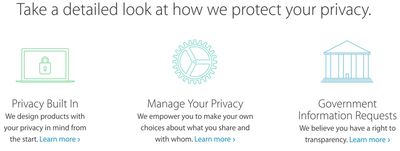Apple today launched a new privacy site that outlines all of the privacy features of Apple's products and services, offers tips on managing privacy, details government information requests, and explicitly states Apple's Privacy Policy.

The site comes alongside a letter on privacy from Apple CEO Tim Cook, who says that the company respects user privacy and protects it with "strong encryption." Privacy and security are of the utmost importance to Apple, according to Cook, and the company designs all of its hardware, software, and services with privacy in mind.
In the letter, Tim Cook says that Apple is aiming to be more transparent about what happens with personal information, detailing how and why it is used by the company. Cook also states plainly that Apple aims to sell great products, not collect user information.
We're publishing this website to explain how we handle your personal information, what we do and don't collect, and why. We're going to make sure you get updates here about privacy at Apple at least once a year and whenever there are significant changes to our policies.
A few years ago, users of Internet services began to realize that when an online service is free, you're not the customer. You're the product. But at Apple, we believe a great customer experience shouldn't come at the expense of your privacy.
Our business model is very straightforward: We sell great products. We don't build a profile based on your email content or web browsing habits to sell to advertisers. We don't "monetize" the information you store on your iPhone or in iCloud. And we don't read your email or your messages to get information to market to you. Our software and services are designed to make our devices better. Plain and simple.
The first section of Apple's new privacy site details the privacy built into "the things you use every day." The site gives information on the ways apps and services are protected and the data that Apple can collect. Services detailed include iMessage, FaceTime, iCloud, Safari, Maps, Siri, Mail, Apps and the App Store, Apple Pay, Health, HomeKit, Spotlight Suggestions, and Randomized Wi-Fi addresses.
For example, Apple states that it cannot access content in the Messages app due to the encryption, and it explains how iCloud data is encrypted.
A second Privacy section is clearly the result of a recent hacking incident that saw several celebrity iCloud accounts compromised. In the section, Apple suggests ways users can improve the security of their devices, pointing towards passcodes, Touch ID, and Find My iPhone.
Apple also instructs users how to create a strong password, how to create proper security questions, and it directs them to turn on two-step verification. In addition, it details phishing scams, suggests users change their passwords on a regular basis, and tells them to keep an eye out for emails sent after Apple ID login attempts.

The final two sections of Apple's privacy site explicitly outline all government data requests that the company has received and offer details on Apple's privacy policy. The site lists examples of the personal information that Apple collects and exactly how that personal information is used. According to Cook, the new site is the result of a "commitment to protecting your privacy." "We know that your trust doesn't come easy," writes the CEO, "That's why we have and always will work as hard as we can to earn and keep it."

















